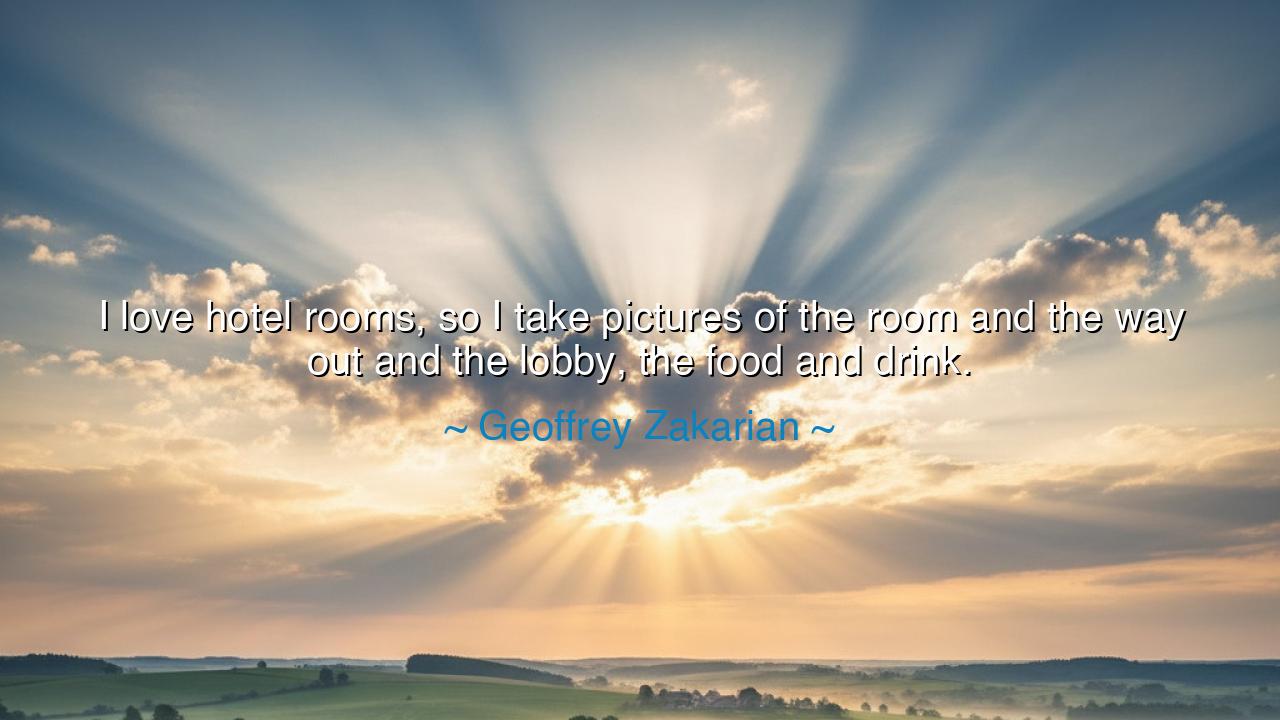
I love hotel rooms, so I take pictures of the room and the way
I love hotel rooms, so I take pictures of the room and the way out and the lobby, the food and drink.






Host: The soft hum of the evening filled the room, as Jack sat at the table, absently scrolling through some photos on his phone. Jeeny, sitting nearby, smiled as she glanced over at the images he was looking at, her curiosity piqued.
Jeeny: (playfully) “You know, Geoffrey Zakarian once said, ‘I love hotel rooms, so I take pictures of the room and the way out and the lobby, the food and drink.’”
Jack: (chuckling) “That’s actually kind of funny. I mean, it’s not the first thing most people think to capture when they stay in a hotel, right? But there’s something interesting about it. Hotels aren’t just places to sleep; they’re like little worlds of their own. And taking pictures of all those small details kind of makes you appreciate them.”
Jeeny: “Exactly. It’s like capturing the essence of a place. Hotel rooms, the lobbies, even the food — they all tell a story about the place itself, don’t they? It’s like you’re documenting your experience, not just as a visitor, but as someone immersed in the whole environment.”
Jack: “Yeah, and there’s something special about a hotel room, too. There’s this sense of temporary freedom, isn’t there? You’re not tied to any one thing, and yet everything is laid out for you in a way that feels both comfortable and a little unknown at the same time.”
Host: The quiet rustling of papers in the background seemed to echo the feeling of curiosity and discovery. Their conversation wasn’t just about hotel rooms or photography; it was about the idea of capturing the moment, about appreciating the small details that often go unnoticed in the rush of everyday life.
Jeeny: “I think it’s also about the way we experience new places. A hotel room isn’t just a bed to sleep in. It’s a temporary home, a space you’re only passing through, and in that brief time, it’s almost like a little sanctuary. The act of taking pictures of those details — the room, the food, the lobby — it’s a way of preserving the feeling of that place.”
Jack: (nodding) “Right. It’s more than just a snapshot of a moment. It’s like freezing that sense of being present in a new space, even if it’s just for a short while. It’s a way of holding onto the experience, to the feeling of being there, of being in that space for a fleeting moment.”
Jeeny: “It’s funny, too, because hotel rooms are typically transitory, but taking pictures of them makes them feel more permanent, doesn’t it? It’s like you’re capturing a tiny piece of a larger story, even if you’ll never see that room again.”
Host: The sound of a clock ticking in the distance seemed to accentuate the idea that moments — and the spaces we inhabit — are temporary, but the memories we create and the way we capture them can make them feel eternal.
Jack: “It’s kind of poetic, isn’t it? How we’re constantly moving, going from one place to the next, but we can still find ways to document the experience. The little details of a hotel room are like reflections of how we live in the moment.”
Jeeny: (smiling) “Yeah, and I think that’s why we love the idea of hotels. They represent a break from our regular lives. They allow us to experience a shift, even if it’s just for a short time. Taking pictures of that shift — of the lobby, the room, the food — it’s a way of preserving those small moments of freedom.”
Jack: “It’s like we’re travelers, even in our own lives. And hotels, in all their simplicity and grandeur, reflect that constant motion, that sense of discovery. Capturing it in a photo helps us hold onto the feeling of being somewhere new.”
Host: The soft breeze outside carried a sense of quiet, as though the world had slowed down for a moment. The idea of hotel rooms, of temporary spaces that we inhabit, now seemed more profound. It wasn’t just about taking pictures; it was about capturing the feeling of being present in a new environment, about finding a moment of stillness in the midst of motion.
Jeeny: “In a way, it’s a reminder that we should appreciate the small, seemingly mundane moments — the lobby, the food, the way a room is arranged. These details are what make a place feel unique, and they’re often what we remember most when we look back on our travels.”
Jack: “That’s the beauty of it, right? Even the smallest things have meaning when we take the time to notice them, when we choose to capture them. It’s not about the destination, but about the experiences that define it.”
Host: The conversation slowed, leaving behind the feeling that the ordinary had been made extraordinary by their reflections. The simple act of taking pictures in a hotel room had become a metaphor for something deeper — the power of presence, the joy of discovering and documenting the details of life, and the understanding that every moment is worth capturing.
And as the scene faded, Geoffrey Zakarian’s words lingered —
that even the smallest moments,
the details of our surroundings,
are worth remembering,
for they capture the essence of who we are
and the places we visit,
even if just for a moment.
For in the temporary spaces we inhabit,
we often find the greatest memories.






AAdministratorAdministrator
Welcome, honored guests. Please leave a comment, we will respond soon